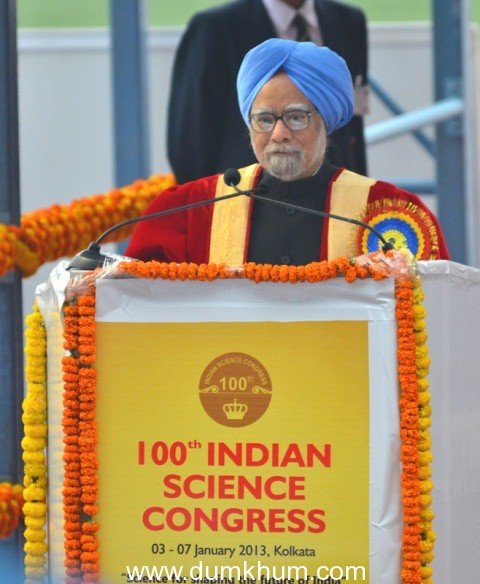PM Unveils New Science, Technology and Innovation Policy at the Centenary Session of Indian Science Congress
The Prime Minister Dr. Manmohan Singh today unveiled the Science, Technology and Innovation Policy (STI) 2013 that aims to put India among the top five science powerhouses in the world by 2020. He presented the first copy to President Pranab Mukerjee at the inaugural session of the Centenary session of the Indian Science Congress in Kolkata.
The STI Policy seeks to bring all the benefits of Science, Technology & Innovation for promoting greater inclusive growth.
Salient features of the STI Policy 2013:
Promote spread of scientific temper amongst all sections of society.
Enhance skills for applications of science among the youth from all social sectors.
Make careers in science, research and innovation attractive enough for talented and bright minds.
Establish world class infrastructure for R&D for gaining global leadership in some select frontier areas of science.
Position India among the top five global scientific powers by 2020
Creating an environment for enhanced private sector participation in R &D.
Promote establishment of large R&D facilities in PPP mode with provisions for
benefits sharing.
Treat R&D in the private sector at par with public institutions for availing public funds
Provide incentives for commercialization of innovations with focus on green
manufacturing. Create a robust national innovation system.
Forge strategic partnerships and alliances with other nations through both bilateral and multilateral cooperation in science, technology and innovation.
Aspirations of the Policy
The main aspirational elements of the STI policy are:
Raising Gross Expenditure in Research and Development (GERD) to 2% from the present 1% of the GDP in this decade by encouraging enhanced private sector contribution.
Increasing the number of Full Time Equivalent (FTE) of R&D personnel in India by at least 66% of the present strength in 5 years.
Increasing accessibility, availability and affordability of innovations, especially for women, differently abled and disadvantaged sections of society.
Mechanisms
Implementation of the proposals contained in the Policy will require consultations with different government departments/ministries and agencies besides consultations with overarching, science and engineering academies, industry and business associations etc .Accordingly Department of Science & Technology will establish a Policy Implementation Group to operationalize the proposals within the next two years.
KOLKATA / DELHI/ RM
II. Prime Minister calls for application of Science & Technology to promote inclusive growth.
Prime Minister Dr. Manmohan Singh today unveiled the new Science, Technology, Innovation Policy 2013 at the Centenary session of the Indian Science Congress in Kolkata.
Speaking at the inaugural session, Dr. Singh said the theme of the 100th Congress ‘Science for shaping the future of India” reflected the dreams of every generation of Indian scientists.
He said, “Faster growth over the next few decades, more sustainable development based on food and energy security, rapid growth of basic social services-such as education and health, are all crucial for defining India’s future. Science, technology and innovation all have an important role to play in achieving these objectives.
Dr. Singh further said that the tools of science must be harnessed to cater to the needs of the under privileged and bridge the gaps between haves and have nots.
Prime Minister said, academic and research systems must foster innovation and entrepreneurship and link up with those interested in commercial development. He said, “we must as a society, enhance the spread of scientific temper.
The Prime Minister said that the transformation of agriculture must be top priority of public policies, including science and technology.
“The Twelfth Five Year Plan assumes that a sustained growth of our agriculture at the rate of 4 percent per annum is essential for the achievement of food security for our country. This growth is constrained by shortages of water and also of land. We need new breakthroughs in water-saving technologies of cultivation, enhancement of land productivity and development
of climate-resilient varieties”, he observed.
KOLKATA/DELHI/PMPIB









